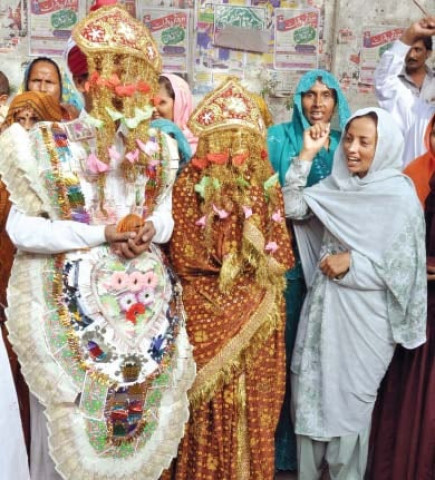The scandal of the Hindu Marriage Act
Pakistan still has not legislated to protect the Family Laws of a segment of non-Muslim minorities.

The scandal of the Hindu Marriage Act
Hindus, the largest minority at around four million, say that the government is actually resisting the passage of the pending law but will not say why. One can surmise that the government could be scared of a backlash from the conservatives. Minister for National Harmony Akram Masih Gill hopes that a Marriage Act for Hindu, Sikh, Parsi and Bahai minorities will soon be passed. The majority community has no idea of what this entails — because of general insensitivity and an obsession with its own religion — to see that the minorities face problems acquiring national identity cards and passports, registering married women, conducting property transfers and travelling abroad.
It is said that a draft law has been framed in consultation with the non-Muslim communities and as far as Hindus and Sikhs are concerned, the proposed regime relating to marriages is in consonance with the legislations passed in India. This would be the best way forward since going back to ancient roots will surely create insurmountable problems. For instance, Hindus are not supposed to divorce but in India, divorce has been made possible in civil court. After 1947, India has wisely subsumed some of the laws that the British Raj had introduced to relieve the hardship of ancient practices. As an example of a very progressive measure, after independence India changed its inheritance law, that initially gave the daughter in a Hindu family nothing, to a full share.
It is expected that the non-Muslim communities in Pakistan will accept all the progressive changes unlike the Muslim minority in India, which refused to accept maintenance by husband after divorcing his wife in the famous Shah Bano case. The problem, however, is connected with the current practice of Muslim law in Pakistan. It outlaws conversion of a Muslim but welcomes the conversion of a non-Muslim to Islam. While conversion under free will is a part of the Declaration of Universal Human Rights, using conversion to break a marriage is not. As one Hindu leader said: “Many young girls from my community are abducted, forced to convert to other religions (sic!), and forcibly married, and later divorced....”.
Because of the absence of law, the minorities are also short-changed in the issuance of Computerised National Identity Cards by Nadra. Till recently before the Supreme Court took note of it, the eunuchs of Pakistan were not fairly and accurately described in the ID cards. It is shocking that while Pakistan as an Islamic state has been evolving rapidly into a more stringently ideological state its minorities have remained completely neglected. Since a section of the Hindu community remains conservative over the issue of divorce, it is advisable to consult the Hindu consensus in India because all religions have faced problems in this regard till divorce was made possible. In this respect Islam has been more progressive.
There is, however, a possible dark side to the issue and one hopes it does not become a factor in the delay of the much-needed law. How will the clerics take this law, especially if the divorce clause in it makes it compulsory for a converted non-Muslim woman to seek divorce from her non-Muslim husband before marrying a Muslim man? So far there have been reported incidents where non-Muslim wives have abused the absence of a non-Muslim divorce law to get an ‘automatic divorce’, so to speak, simply by announcing that they had converted. Regrettably there have been cases too of collective rape where non-Muslim girls were forcibly converted, forcibly married, and then divorced shortly thereafter. And that is precisely why parliament needs to pass the Hindu Marriage Act as soon as possible.
Published in The Express Tribune, September 21st, 2011.



















COMMENTS
Comments are moderated and generally will be posted if they are on-topic and not abusive.
For more information, please see our Comments FAQ